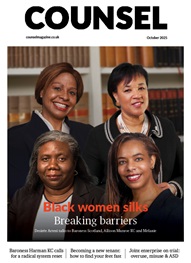*/
Criminal barristers have reacted angrily to last-minute changes to a deal on Very High Cost Criminal (“VHCC”) cases. Bar representatives have been negotiating with Ministry of Justice officials for nearly two years to secure a flexible pay scheme for advocates working on VHCC cases, which include the most serious terrorism and murder trials. However, in November the government said it wanted to introduce a new option: extending the existing fixed-fee scheme for shorter cases of up to 40 days to include cases lasting up to 60 days. The Legal Services Commission (“LSC”) confirmed the change in its consultation paper, published in December, “Very High Cost (Crime) Cases 2010”.
Criminal barristers have reacted angrily to last-minute changes to a deal on Very High Cost Criminal (“VHCC”) cases. Bar representatives have been negotiating with Ministry of Justice officials for nearly two years to secure a flexible pay scheme for advocates working on VHCC cases, which include the most serious terrorism and murder trials. However, in November the government said it wanted to introduce a new option: extending the existing fixed-fee scheme for shorter cases of up to 40 days to include cases lasting up to 60 days. The Legal Services Commission (“LSC”) confirmed the change in its consultation paper, published in December, “Very High Cost (Crime) Cases 2010”.


Justice system requires urgent attention and next steps on the Harman Review
Q&A with Tim Lynch of Jordan Lynch Private Finance
By Marie Law, Director of Toxicology at AlphaBiolabs
By Louise Crush of Westgate Wealth Management
Why Virtual Assistants Can Meet the Legal Profession’s Exacting Standards
Despite increased awareness, why are AI hallucinations continuing to infiltrate court cases at an alarming rate? Matthew Lee investigates
Many disabled barristers face entrenched obstacles to KC appointment – both procedural and systemic, writes Diego F Soto-Miranda
The proscribing of Palestine Action under the Terrorism Act is an assault on the English language and on civil liberties, argues Paul Harris SC, founder of the Bar Human Rights Committee
For over three decades, the Bar Mock Trial Competition has boosted the skills, knowledge and confidence of tens of thousands of state school students – as sixth-form teacher Conor Duffy and Young Citizens’ Akasa Pradhan report
Suzie Miller’s latest play puts the legal system centre stage once more. Will it galvanise change? asks Rehna Azim